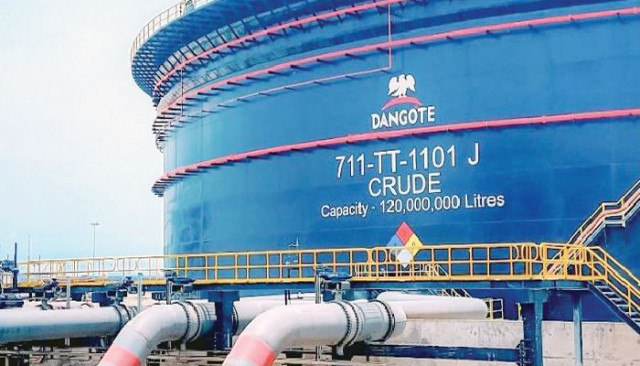There is optimism that the Dangote Refinery may offer Premium Motor Spirit (PMS), commonly known as petrol, to Nigerians at a lower price due to the Federal Government's reinstatement of the crude and refined product sales in naira initiative.
Updating on the initiative, the Federal Ministry of Finance, via its X account, announced that the Technical Sub-Committee on the Crude and Refined Product Sales in Naira initiative held a meeting on Tuesday to evaluate progress and address current implementation issues.
The ministry reported that key attendees included the Chairman of the Implementation Committee and Minister of Finance and Coordinating Minister of the Economy, Wale Edun; the Chairman of the Technical Sub-Committee and Executive Chairman of the Federal Inland Revenue Service (FIRS), Zacch Adedeji; and the Chief Financial Officer of Nigerian National Petroleum Company Limited (NNPCL), Dapo Segun.
Other participants included the Coordinator of NNPCL Refineries, Management of NNPC Trading, representatives from Dangote Petroleum Refinery and Petrochemicals, along with senior officials from the Nigerian Upstream Petroleum Regulatory Commission (NUPRC), Nigerian Midstream and Downstream Petroleum Regulatory Authority (NMDPRA), Central Bank of Nigeria (CBN), Nigerian Ports Authority (NPA) and Afreximbank, alongside the Committee’s Secretary, Hauwa Ibrahim.
The ministry stated: “The stakeholders reiterated the government’s dedication to the complete execution of this strategic initiative, as directed by the Federal Executive Council (FEC). Consequently, the Crude and Refined Product Sales in Naira initiative is not a temporary measure, but a significant policy directive aimed at fostering sustainable local refining, enhancing energy security, and reducing dependence on foreign exchange in the domestic petroleum sector.”
The committee acknowledged that, as with any substantial policy change, challenges in implementation may occur from time to time.
“Nevertheless, such challenges are being proactively managed through collaborative efforts among all parties involved. The initiative is ongoing and will continue as long as it serves the public interest and supports national economic goals,” it remarked.
While recognizing the potential challenges associated with naira transactions, the government assured that implementation is proceeding smoothly, with all stakeholders engaged in addressing any emerging issues.
The naira-for-crude arrangement, launched in October 2024, permits domestic refiners to purchase crude oil using naira instead of foreign currencies, aiming to enhance local refining, lessen reliance on foreign currency, and strengthen energy security. However, this agreement encountered a setback earlier this year, raising significant concerns about its future viability.
In March 2025, the first phase of a six-month arrangement between NNPCL, local refiners including Dangote Refinery, and the government concluded. One of the reasons for the suspension was the prior commitments of crude oil production to existing forward contracts, preventing NNPCL from fully adhering to the naira-for-crude framework.
During the suspension, Dangote disclosed that its naira sales had already surpassed the value of locally-denominated crude oil acquired, necessitating a shift to dollar-based sales.
Following the March suspension, Dangote stopped selling refined petroleum products in naira, citing the non-extension of the agreement. This change raised fears of potential hikes in fuel prices, as the refinery had to revert to procuring crude oil using foreign currencies, which in turn increased the cost of refined products.
The halt of the naira-for-crude deal also heightened concerns regarding the impact on Nigeria’s foreign exchange reserves. As crude oil prices are usually settled in U.S. dollars, this suspension compelled domestic players to seek foreign currency, further exacerbating the existing strain on the country’s foreign exchange market. With the naira struggling against the dollar, these circumstances could intensify Nigeria’s economic challenges, particularly in terms of inflation and the rising cost of living for everyday Nigerians.
Adedeji indicated that there has been no policy-level decision to terminate the framework.
He stressed that the naira-for-crude arrangement is still in effect, with the government fully dedicated to its objectives of enhancing local refining abilities and reducing dependence on foreign currency.
The policy was established to support local refineries such as NNPC’s and Dangote Refinery, ensuring that crude oil transactions could take place in naira, thus bolstering the nation's efforts to improve domestic refining capabilities and diminish reliance on foreign currency for importing petroleum products.




















